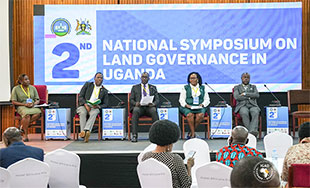Uganda's Gender Revolution: Women's Land Rights Key to Climate-Smart Agriculture
Uganda takes bold steps to empower women farmers through land rights reform, recognising their crucial role in climate-resilient agriculture. The initiative, supported by regional authorities and international partners, aims to transform agricultural productivity while addressing gender inequality in land ownership.

Ugandan women farmers working in agricultural fields, representing the crucial intersection of gender equality and climate-smart agriculture
Uganda's Parliamentary Push for Women's Agricultural Rights
In a significant move towards agricultural reform and gender equality, Uganda's parliament has placed women's land rights at the centre of its climate-smart agriculture initiative. The development, marked by the 2nd Parliamentary Symposium on Land Governance, represents a crucial shift in addressing both environmental resilience and gender disparity in the agricultural sector.
'Women with secure land rights are more likely to adopt climate-smart agriculture, diversify income, and educate their children. Therefore, enhancing women's access to and ownership of agricultural land is not a charity; it is a strategic investment in Uganda's present and future,' stated Judith Nabakooba, Uganda's Minister of Lands.
The Gender Gap in Agricultural Productivity
The stark reality of gender inequality in Uganda's agricultural sector presents a compelling case for reform. Despite women comprising 70% of the agricultural workforce, only a small fraction possess land ownership rights. This disparity significantly undermines agricultural productivity and economic potential.
Regional studies highlight the severity of the issue:
- Kenya reports an 8% gender gap in agricultural productivity
- Broader regional assessments show gaps between 43% and 72%
- Limited land ownership directly impacts women's decision-making power over agricultural resources
Strategic Partnerships for Change
The initiative brings together multiple stakeholders, including:
- The Intergovernmental Authority on Development (IGAD)
- Government ministries and parliamentary bodies
- International organisations like Oxfam
- Civil society groups and development partners
Climate Resilience Through Gender Equality
The symposium's focus on women's land rights aligns with broader climate adaptation strategies. Secure land tenure for women farmers is increasingly recognised as crucial for implementing climate-smart agricultural practices and ensuring food security.
'Securing women's land rights is not just about property -- it is about power, dignity, and the future of our communities,' emphasised Francis Odokorach, Oxfam Uganda Country Director.
Looking Forward: Policy Implementation
The symposium's outcomes are expected to inform concrete parliamentary actions and policy development, particularly within the Food Systems Resilience Program (FSRP). This seven-year World Bank-funded initiative aims to strengthen food security and resilience across Eastern and Southern Africa.
The success of these reforms will depend on effective implementation and cultural transformation, challenging traditional barriers to women's land ownership while promoting sustainable agricultural practices.
Thomas Reynolds
Correspondent for a London daily, specialist in British foreign policy and transatlantic issues.
